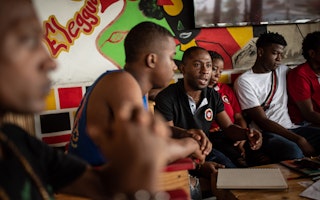Human Rights Defenders in Honduras Need a Defender, Too
By Daysi Flores

In a country as violent as Honduras, trust is critical to any alliance, a fact starkly illustrated by the tragic case of Berta Cáceres.
Cáceres, the leader of the Council of Popular and Indigenous Organizations of Honduras (COPINH), an organization representing the Lenca community, was murdered in March after facing years of persecution from the Honduran state. Apparently killed for protesting development on indigenous lands, in this case a hydroelectric dam, she died, like so many activists before her, protecting natural resources from exploitation.
In April, five men were arrested for her murder, including a mid-level employee of Desarollos Energéticos, the Honduran company leading the dam project, and two others with ties to the military. In May, a Dutch group that had invested in the dam announced it was seeking a “responsible exit from the project.”
Cáceres was not the first indigenous person to be killed or attacked for defending land or water, and her harassment at the hands of the Honduran state began well before her murder. In 2012, she was charged with illegal possession of weapons while organizing protests against a proposed dam in the Lenca community of Rio Blanco. She notified our organization, Just Associates (JASS), which works to build communities of trust and support among those who take a stand against dams, mining, logging, and agricultural projects that threaten their natural resources or livelihoods.
After she notified us, the network was activated, and more than 150 international and Latin American organizations and colleagues began calling the facility where she was being held to demand her release. Although the charges remained, she was allowed to go home after just two days in detention.
Later, in the case of Cáceres’s death, we worked aggressively with other human rights defenders and her family to ensure that those responsible were held accountable, including organizing a delegation to the United Nations and meeting with members of the Dutch mission about funding of the dam.
JASS makes every effort to ensure human rights defenders are prepared for the challenges they will face, including by running Alquimia, a three-year leadership and community organizing school that brings together 25 indigenous and rural women from seven countries in Mesoamerica. JASS and its allies also built the Mesoamerican Women Human Rights Defenders Initiative (known for its Spanish acronym, IMD), a collaborative effort of six organizations that develops regionally responsive strategies to address the specific forms of violence and sexism women human rights defenders face. IMD unites nearly 700 groups and individual defenders in five countries of the region—Mexico, Honduras, El Salvador, Guatemala, and Nicaragua. In 2014, it was recognized for its contributions to the field with the Letelier-Moffit Human Rights Award.
So far, IMD has assisted more than 350 women in developing strategies for safety that address sexism and violence. In addition to facilitating and promoting trainings on human rights mechanisms and holistic protection measures, IMD helped establish national processes to protect women human right defenders, including protective accompaniment, emergency relocation, and shelters. But Cáceres’s assassination shows how much work remains to be done. We must ensure the protection of women human rights defenders and strengthen their demands for justice and voice in development decisions within their communities and across borders.
Just Associates is a grantee of the Open Society Foundations.
Daysi Flores is the Honduras country coordinator at Just Associates.


